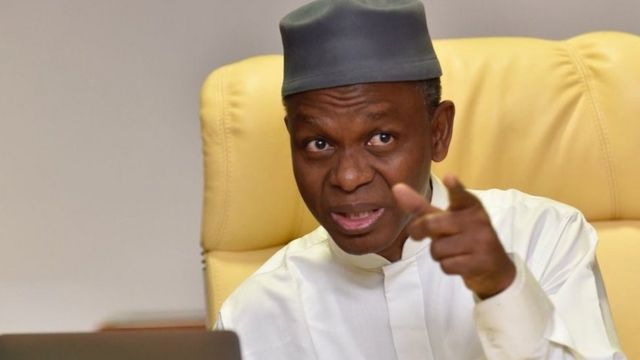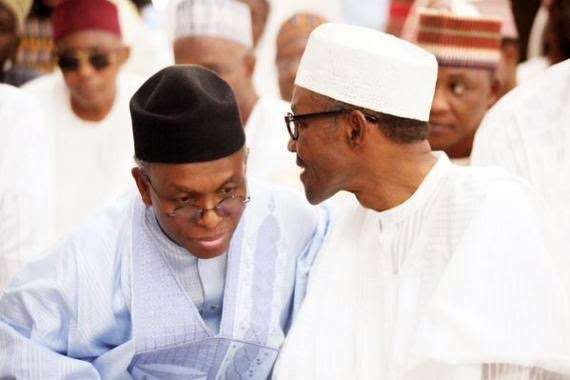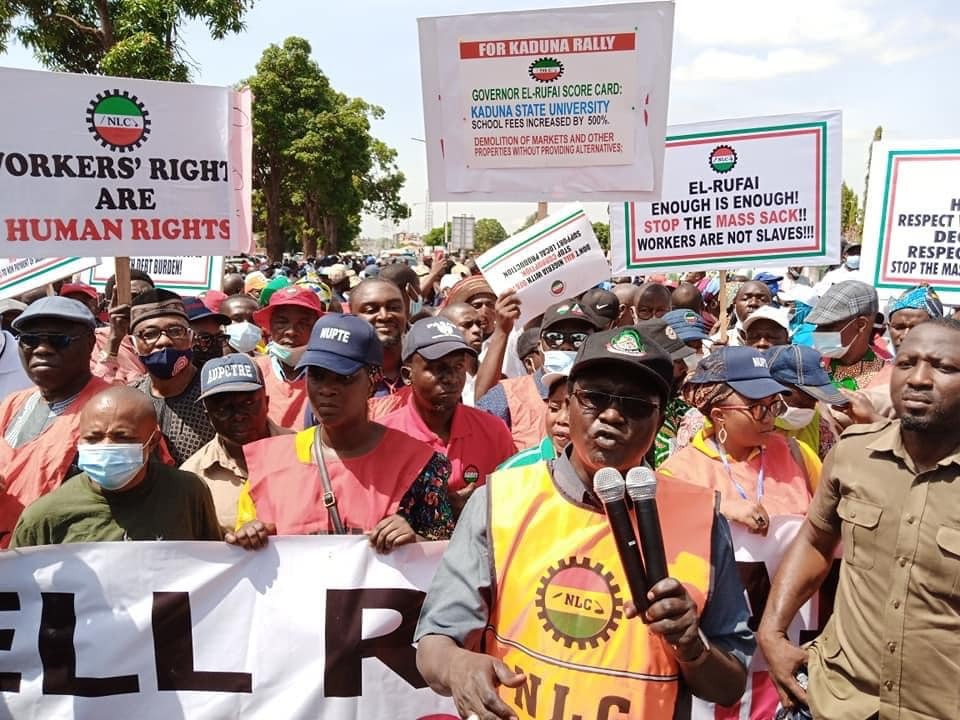Chidi Amuta
The first time I entered his office at the Bureau of Public Enterprises many years ago, I met a man who was literally not there. The executive chair of the Director General was vacant. El-Rufai was in the office but seated alone at the conference table organizing some piles of paper work and obviously poring over banks of statistics. I quickly deduced that the man probably wanted the focus to be on the functionality of the office, not the pompous ego of its occupant. I had come to see him with some Directors of Dow Jones International on behalf of The Wall Street Journal whose interests in Nigeria I was overseeing at the time. That was many years ago.
Today, Nasir El-Rufai as Governor of Kaduna state, is turning out to be an uncommon political animal. He has stamped a distinctive identity and style on the business of governance in his old and problematic state. Habitually restless and infinitely disruptive in his pursuit of change and drive for his conception of excellence in governance, the man seems indifferent to populist approval and spontaneous ovation. I am not sure the man craves either roadside accolades let alone the approval ratings of the elite whose vested interests he has frequently scorched. No one is sure what celebration or condemnation awaits him at the other end of his tenure. What is certain is that by most estimates, his two term tenure at the helm of Kaduna will end up being quite turbulent. He probably has his eyes on some abstract notion of legacy for posterity which may end up a flight of fancy.
For this governor, a certain restless pursuit of change, reform and constant innovation seems to have assumed a life of its own. Consequently, some people in Kaduna and indeed the rest of the contrary have already branded El-Rufai an irredeemable killjoy and merchant of unhappiness especially in the mind of a populace used to convention and governance as business as usual. People have begun to wonder why this governor does not want to sit pretty and enjoy the cozy ride on the gravy train of power and privilege. In many ways, Mr. El-Rufai’s approach to governance can only arouse curiosity in the context of the Nigerian tradition of the drama of power. It is definitely a rude departure from a national political culture of the governor as ‘big man’. In these parts, the job of state governor can be either a challenge to selfless service or a ticket to unbridled privilege and merciless looting. Only a minority in the tradition of Balarabe Musa, Lateef Jakande, Raji Fashola and a few good military governors would seem to have chosen the tradition of personal discomfort and restless service. Mr. El- Rufai seems to have chosen this path of uncomfortable visionary service. No dull moment. Every day in power is an adventure in a new turbulence, a new controversy, another upset of conventional wisdom and the received order of things. Mr. El-Rufai seems to delight in whipping up all the sleeping dogs of our old society in his state. As a result, his tenure in the Kaduna government house is likely to be the most turbulent and consequential in the history of that old state to date.
In recent weeks, however, the governor has amped up his fight against what he perceives as one of the ills of our decadent governance culture. Nigerians have since been crowing about the high cost of governance in the country at all levels. Usually the rhetoric of reducing the cost of governance has focused on the emoluments and benefits of mostly political appointees. Very little attention is usually paid to the salaries, benefits and multiple entitlements of civil servants. Even the civil service labour unions and the Nigerian Labour Congress are quick to join in the chorus against the high cost of governance as mirrored in the perks and emoluments of political appointees.
When the pendulum swings to the high cost of maintaining our over bloated public service usually at the expense of the rest of the general populace, our labour unions opt to defend the interests of the small percentage of the population that are lucky to be in the employment of federal and state governments. Here is a moral conundrum for labour as a social democratic force: should labour fight for the interests of all oppressed peoples or those of a tiny elite that are lucky to enjoy state wages often to the detriment of other aspects of general development?
The face off between Governor El-Rufai and the various labour unions in recent weeks is all about an area of darkness in our public policy thinking. The governor wants to right size the state’s pubic service labour force. This is a needed national reform effort that ought to attract the support of federal and state levels. At federal and state levels, the bulk of recurrent personnel costs of governments goes to the payment of salaries and benefits of civil servants and pensioners. But in general, only less than 10% of the population of an average state is employed in the public service. The rest of the populace is either self employed in small to medium scale businesses or are farmers, artisans or anonymous citizens left out by a system that hardly recognizes their very existence.
It has often been argued that in our pre-industrial society, the public service functions as a disguised social security structure since every civil servant has direct or indirect responsibility for any number of other dependents. This is only a half truth. Beside their salary and wage obligations to their civil servants, the average state government has other overarching obligations. There are social services like education, healthcare, municipal services and social welfare issues that must be kept running if the state is not to degenerate to just a mere salary payment office. There are capital projects in infrastructure and general development to be funded if the state is to be competitive. A good number of states have little or nothing left to discharge other mandatory and statutory obligations after pay staff salaries. . And the current entitlement syndrome of our federalism hardly compels most of the states to generate additional revenue to meet their other obligations. This is the conundrum that lies at the root of the current face off between governor El -Rufai and labour unions over his decision to right size the state’s civil service.
In the specific case of Kaduna State, the raw figures are unflattering. The office of the governor has disclosed that an average of 94-96% of the state’s FAAC receipts in an average month is used to pay the salaries of civil servants. According to figures made available by the governor’s office, in March 2021, the state received N4.819 billion from the FAAC. It paid out N4.498 Billion representing 93% of the funds received. It had only N321 million left to service its multiple other obligations. The pattern is repeated in most months of the year. The total number of state civil servants stands at 31,064. Even with the addition of employees of local governments and pensioners, we are still dealing with a figure of less than 100,000 public service dependent employees in a state with a population of about 7 million.
The perspective of the El Rufai government is that the object of government is the development of the state in general, not the payment of salaries to only a minority of the population. This is the rationale behind the decision of the government to right size the civil service in order ot strike the right balance between development and the maintenance of a functioning workforce to drive the machinery of government. To date, the labour unions have not faulted this logic neither have they advanced contrary figures to challenge the argument of the government.
What governor El-Rufai has done is to name a wrong that is afflicting both the federal and all state government in the country. Both the federal government and the governments of all the 36 states of the federation and the Federal Capital Territory ought to be grateful to El-Rufai for walking where angels fear to even tiptoe. We have over the years encouraged the growth of large bureaucracies of mostly unproductive personnel. The battle in Kaduna state is therefore more of a national public expenditure reform imperative than the isolated war of just one irreverent governor. It is therefore surprising that no state government has yet identified with governor El -Rufai. Neither have we heard from the federal government itself whose share of the burden of an unproductive bureaucracy accounts for the stunted development of the nation in general.
There may be reservations about Mr. El-Rufai’s specific tactics in handling a matter that touches on the vested interests of a very powerful segment of Kaduna citizens. There probably should have been a bit more dialogue with the interest groups. The governor should probably have adopted a graduated programme of disengagement of the excess manpower in the state service. There probably should have been more detailed engagement with labour unions on terms of disengagement or programmes to assist those to be laid off adjust to life without monthly salaries in the form of entrepreneurship mentoring and training for alternative occupations. Details of the financial arrangements ought to be tabled alongside the termination notices for all parties to consider.
Irrespective of how the current face off with the state’s civil servants is resolved, there is in the current crisis a certain unmistakable stamp of El Rufai’s definitive governance style. This may in fact be one instance in contemporary Nigerian public life where the personal traits of a high state official impacts directly on his approach to public policy and governance more for good than ill. Mr. El-Rufai has brought to bear on his public service record to date, an unmistakable trait of personal courage, reformist zeal and impeccable commitment to the public good which ought to be held up as an example of how we should aspire to do the business of Nigeria.
With an impeccable clarity of thought and sometimes acerbic tongue, the man meets most of the requirements of the modern leadership that Nigeria requires. He is enlightened, engaging, informed about critical national issues and armed with an indispensable statistical mind set.
From inception, the man left no doubts about his broad vision for the state and what he wanted to do with the power and authority of the office of governor.
He has embraced our national diversity by hiring a few non indigenes to serve in his administration. He has queried some previously untouchable traditional rulers. He has dared the opposition to show the people a better road map. He has demolished a few houses without approved plans or those located in places where there should have been no private development. He has dared to name the wrong by identifying and sacking illiterate teachers, ghost workers, idle civil servants and generally questioning the general qualification, efficiency level and service quality of public servants. On ransoms to bandits that abduct students and other citizens, El-Rufai has insisted that the best approach is not to pay or negotiate with bandits and hoodlums.
Looking back, El-Rufai as Minister of the FCT is remembered more for demolishing peoples houses built in wrong places and canceling dodgy land titles in Abuja. His decisiveness in these matters marked him out as a stickler for compliance and decisive governance. To his credit, his insistence on adherence to the original Abuja master plan helped restore some sanity in the capital against the background of disorderly development by land speculators and greedy landlords. He brought some sanity to bear on land administration in the FCT by digitalizing the land registry and the process of land allocation and title transfers. Of course some wrote off his tenure as a reign of terror and callous indifference to the sweat ands tears of some developers.
In a sense, however, the complexity of Nigeria is somehow mirrored in the demographics and cultural ecosystem of Kaduna state. Here, an indigenous local Hausa population is embroiled in endless land and authority disputes with Fulani settlers. Similarly, the national sectarian fault line of Muslim versus Christian is at its most naked virulent display in Kaduna state. Between Southern Kaduna and Northern Kaduna, an oppressor settler versus oppressed indigenous fractious relationship has for decades furnished a landscape of interminable conflict and blood -letting. Over and above this perpetually smouldering cauldron of blood, violence and intolerance is Kaduna city’s status as an aspiring modern cosmopolitan home of international industrialists, other Nigerian investors, multi national corporations and their staff and families. This city is also the home of most of the core elite of what was once Northern Nigeria. To preside over this complex state can be almost as daunting as running the entire Nigerian amorphous behemoth.
Mr. El-Rufai can be astutely nationalistic but he is also a fiery and vicious embodiment of the truism that every politics is first local. I doubt that El- Rufai makes any apologies about his primary allegiance to Northern Nigeria as it once was. But he is armed with a clear direction and unambiguous convictions about where modernity ought to take that region of the country in this day and age.
As Governor of the hotbed legacy state of Kaduna, there is a sense in which Mr. El Rufai can be seen as the political custodian of the symbolic soul of what used to be Northern Nigeria. More importantly, there is every reason to see Mr. El Rufai’s burdens of governance as emblematic of the more complex challenge of state administration in today’s Nigeria. But as one of 36 state governors, Mr. El Rufai is just another state chief executive and therefore only one anchorman in the post civil war national order that used smaller states to replace the menacing political threat of the old regions. Thus, no matter how historically strategic Kaduna may have been in the old Nigeria, the governor of that state, no matter how politically sagacious he may be, is only one out of 36 co-equals and therefore can not assert a ‘first among equals’ status in today’s political arithmetic.
Yet, hate him or love him, El- Rufai has defined for himself a troubling relevance that is hard to ignore but difficult to embrace or endure. He presides over a state that is a crucible of an open naked and nasty confrontation between tradition and modernity and between orthodoxy and a certain avant garde innovativeness. Beyond his immediate exertions and challenges as Governor of Kaduna state, his public service career to date marks him out as being in the vanguard of a new breed of leadership that Nigerians are likely to keep hearing from for quite some time. He is, along with the likes of former Emir of Kano, Sanusi Lamido Sanusi, Col. Abubakar Dangiwa Umar(Rtd), Brig. Gen. Buba Marwa(Rtd) and others, a face of the new Northern political enlightenment that Nigerians desire and deserve. This small group is liberal minded, at home with an entrepreneurial culture, at home in the West as well as in the best places of Islamic culture and learning.
On a good day, Mr. El -Rufai would hold his own in the midst of the most informed officials of state. He has an acute statistical sense of the Nigerian reality, a point that raises him above the common run of politicians all over the country. Again in a country that is remarkable for its habitual elevation of all manner of nonentities to dizzying heights of power, influence and authority, Mr. El -Rufai’s intellectual confidence and reformist vigour offers a refreshing departure. How he converts these assets into political capital in the future is entirely his kettle of tea.



